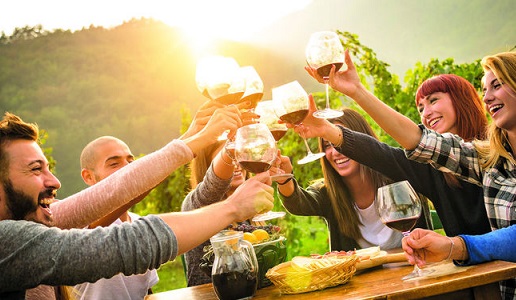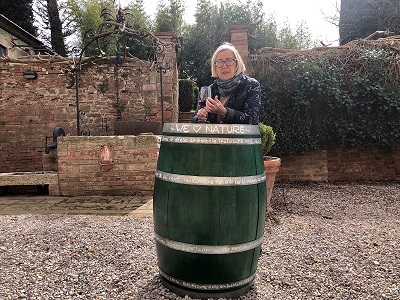Donatella CInelli Colombini: wine tourism killed by the Covid-19

We receive this cry of alarm from Donatella Cinelli Colombini, wine producer, creator of the Open Cellars day, currently president of the Women of Wine. The global tourism crisis is blocking a 1,300 billion billion business by emptying planes, hotels, restaurants, travel agencies and wineries that are losing their best customers.
Tourism is the main economic victim of the covid epidemic: 1.4 billion travelers a year with a global business of around 1.3 trillion blocked by fear. Fear of getting on a plane where there might be contagious passengers or going to hotels or restaurants where the previous traveler, perhaps sick of Covid-19, might have sneezed on blankets or bread baskets.... Imprisonment in the home has increased the perception of danger compared to everything outside the home, so that holidays, rather than moments of escape, appear as an anxiety-inducing experience with the coronavirus always lurking.
Better to avoid? A perspective that the President of the European Commission Ursula Von der Leyen expressed with the phrase "do not book next summer's holidays" and that the President of the Istituto Superiore della Sanità Silvio Brusaferro resumed on April 17 "it's early to think about holidays".
In this disastrous 2020 every country will try to keep its citizens within its own national borders and probably Italians will also make proximity trips. For this reason, tourist destinations where travelers are predominantly Italian will be less affected than regions such as Tuscany, where arrivals from abroad have very high percentages and among them the U.S. are numerous (9% of total arrivals). A real meltdown is emerging here. Let's not forget that foreign tourism is worth over 40 billion for Italy.
More serious is the situation in the countryside where tourism has developed in recent years in the form of agritourism and food and wine tourism. In these areas, for example, restaurants do not have, or have very few local customers and, compared to their city colleagues, cannot use delivery as an alternative. I would not rule out the possibility that many would decide to remain closed for the whole of 2020.
In addition to the decrease in tourist flows, there is in fact another aspect to consider: the effects of possible contagion where, for now, the coronavirus epidemic has been almost absent. Let us consider the most problematic tourist activities, those of farms - accommodation, catering and wine tourism - which are ancillary and often in promiscuity, with their own agricultural work. Bringing visitors to the farm increases the number of protective measures to be taken in the enterprise as a whole, but above all increases the probability of contracting covid. In such an eventuality the obligation of quarantine could concern both those working in hospitality and the staff of wineries, offices, vineyards and other typically rural activities, with the total blockage of each production.
For food and wine tourism destinations that in recent years have grown in double digits acting as a locomotive to the recovery of tourism in Italy, the near future seems very worrying. Chianti Classico, the Langhe, Valpolicella... have built an authentic economic system on the attraction of wine with hotels and farmhouses, restaurants, wine bars, wineries open to the public for visits, tastings and direct sales.
To restrict the examination of the tourist problems created by the coronavirus to wineries alone, it is conceivable that the 25,000 Italian wineries open to the public, including 5-8,000 well-organized hospitality companies, employ around 30,000 seasonal employees in charge of wine tourism, in addition to permanent staff and members of producer families. All of them could be unemployed.
If we look at the economic repercussion of the lack of direct sales in the cellars, we have equally discouraging data: 2-2.5 billion Euros, which is an important liquidity for Italian companies but above all a source of income with much higher margins than normal commercial channels.
As Roberta Gribaldi has well highlighted in her Reports on wine tourismDonatella Cinelli Colombini, creator of the Open Cellars Day and the first promoter of wine tourism in Italy, teacher of wine tourism in University Masters and author of three manuals on wine hospitalitymic in Italy and the Wine Cities with the Observatory directed by Professor Giuseppe Festa, wine tourism includes an articulated series of consumption that only partially concern wineries. It is to be assumed that for one Euro spent in the purchase of bottles the visitor pays another 5 Euro in the wine areas to eat, sleep, shop for traditional specialities or take part in events, courses, tastings and other occasions of entertainment.
According to data from the Bank of Italy (2019), foreign tourists in Italy spend 12 billion a year on food and wine consumed during meals or purchased as gourmet shopping. An authentic engine for catering and shops in all tourist cities. An engine that today is turned off and will also slow down those who supply these places of consumption and sale, i.e. wineries and producers of excellent food specialties. Let's not forget that until last year half of the 58 million foreign tourists in Italy had bought at least one bottle of wine.

Donatella Cinelli Colombini,
creator of the day Open Cellars and
the first promoter of wine tourism in Italy,
teacher of wine tourism in University Masters and
author of three manuals on wine hospitality.

 Italiano
Italiano








